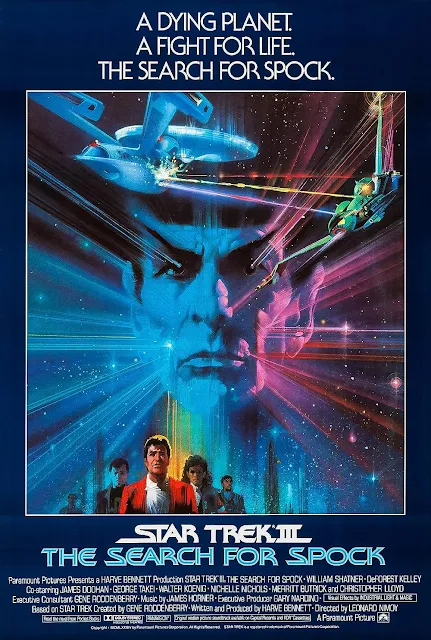The Needs of the One: Friendship and Sacrifice in The Search for Spock
*Star Trek III: The Search for Spock*, released in 1984, is the essential middle chapter in what many fans consider a perfect trilogy. Directed by Leonard Nimoy himself, the film had the monumental task of resolving the heart-wrenching cliffhanger of *Star Trek II: The Wrath of Khan*. It’s a deeply personal and emotional journey that explores the lengths to which a chosen family will go for one of their own, cementing the themes of loyalty and sacrifice as the franchise's bedrock.
Plot: A Heist for a Soul
The film picks up with the battered USS Enterprise returning to Earth, its crew mourning the death of Spock. Admiral Kirk grapples with his profound loss, while Dr. McCoy begins acting erratically. The mystery deepens with the arrival of Spock's father, Sarek, who reveals a startling truth: in his final moments, Spock transferred his **katra**—his living spirit or consciousness—into McCoy's mind. Meanwhile, Spock's body, jettisoned onto the newly formed **Genesis Planet**, has been regenerated by the device's unstable energy matrix. The mission becomes clear: Kirk must reunite Spock's body with his katra on Vulcan via a dangerous ancient ritual called the **fal-tor-pan**.
When Starfleet denies Kirk's request and orders the Enterprise to be decommissioned, Kirk and his loyal senior officers make a fateful choice. They defy orders, sabotage the USS Excelsior, and steal their beloved ship for one last, illegal mission. Their quest is complicated by the Klingon Commander **Kruge** (a menacing Christopher Lloyd), who seeks to capture the Genesis device and turn it into a devastating weapon, leading to a deadly confrontation on the self-destructing planet.
Themes: Friendship, Sacrifice, and Rebirth
The core theme of the film is **friendship and loyalty**. It powerfully inverts Spock's dying words from the previous film. Where Spock sacrificed himself because "the needs of the many outweigh the needs of the few," Kirk risks everything for his friend, later telling Sarek, "the needs of the one outweigh the needs of the many." This declaration becomes the crew's driving philosophy, showcasing a bond that transcends duty and regulation.
This loyalty demands immense **sacrifice**. Kirk gives up his career, his future, and ultimately, his beloved starship. The destruction of the USS Enterprise is one of the most shocking and iconic moments in Star Trek history. Kirk's order, "My God, Bones... what have I done?" is met with McCoy's perfect reassurance: "What you had to do. What you always do. Turn death into a fighting chance to live." This theme is tragically echoed when Kirk's son, David Marcus, sacrifices his own life to save Saavik and a regenerated Spock from the Klingons, a loss that will haunt Kirk for years to come.
Finally, the film is a story of **resurrection and rebirth**. Spock's journey from a rapidly aging child to a man rediscovering his identity is a fascinating exploration of Vulcan mysticism and science fiction. The unstable nature of the Genesis Planet, which causes life to age and die in minutes, adds a layer of scientific horror to this spiritual quest.
Direction and Legacy
As his directorial debut, **Leonard Nimoy** brought an intimate and character-focused sensitivity to the film. His deep understanding of the characters, especially Spock and Vulcan culture, lends an unparalleled authenticity to the story. The final scenes on Vulcan, culminating in the poignant moment when a reborn Spock remembers his captain's name, are masterfully handled and deeply moving.
**James Horner** returned to compose the score, shifting from the militaristic themes of *Khan* to a more mystical and emotional soundscape. His beautiful and haunting theme for Spock's resurrection is one of the most beloved pieces of music in the entire franchise. The film's legacy is secure as an essential, emotional, and rewarding middle chapter. It beautifully pays off the sacrifice of *The Wrath of Khan* and sets the stage for the triumphant reunion in *The Voyage Home*, forming one of cinema's greatest trilogies.

















